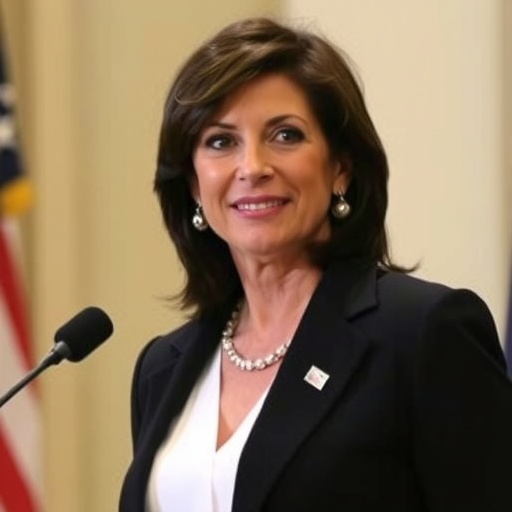DHS Secretary Kristi Noem Defends $170 Million Private Jets Amid Federal Shutdown Backlash
In a move that’s ignited a firestorm of controversy, Homeland Security Secretary Kristi Noem has staunchly defended the Department of Homeland Security‘s (DHS) acquisition of two luxury private jets totaling $170 million in public funds, even as a prolonged federal shutdown leaves essential aid programs in limbo. The announcement, revealed during a tense press briefing on Capitol Hill, comes at a time when furloughed federal workers are struggling to make ends meet, amplifying public outrage over what critics are calling an egregious misuse of taxpayer dollars.
- Noem’s Justification: Jets as ‘Essential Tools’ for Border Patrol
- Breaking Down the $170 Million Deal: Luxury Features Under Fire
- Public Outrage Boils Over: Protests Target Noem’s Lavish Choice
- Federal Shutdown’s Ripple Effects: Aid Programs Suffer as Jets Soar
- Congressional Hearings Ahead: Will Noem’s Jets Deal Face the Ax?
Noem, a former South Dakota governor appointed to lead DHS under the current administration, argued that the jets are vital for rapid response to national security threats. “In an era of escalating border crises and cyber vulnerabilities, we cannot afford delays,” she stated firmly, her voice echoing through the briefing room packed with skeptical reporters. Yet, as images of the sleek, high-tech aircraft surfaced online, social media erupted with accusations of tone-deaf extravagance, drawing parallels to past scandals involving executive perks.
Noem’s Justification: Jets as ‘Essential Tools’ for Border Patrol
Secretary Kristi Noem’s defense of the private jets purchase centered on their purported necessity for DHS operations, particularly along the U.S.-Mexico border. Speaking to a panel of journalists, Noem emphasized that the aircraft—two customized Bombardier Global 7500 models equipped with advanced surveillance tech—would enable quicker deployments of agents and resources. “These aren’t luxuries; they’re lifelines,” she asserted, citing recent incidents where response times to migrant surges exceeded 48 hours due to reliance on commercial flights.
According to DHS internal memos obtained by investigative outlets, the jets feature state-of-the-art communication systems, secure data links for real-time intelligence sharing, and even medical evacuation capabilities. Noem highlighted statistics from the past fiscal year: over 2.4 million encounters at the southwest border, a 30% increase from 2022, straining existing aviation assets. “Public funds are being invested in tools that save lives and secure our nation,” she added, pointing to a projected reduction in operational costs by 15% over five years through minimized downtime.
However, budget analysts question the math. The Federal Aviation Administration (FAA) reports that DHS already maintains a fleet of 12 aircraft, including helicopters and smaller planes, with utilization rates hovering around 70%. Critics, including former DHS undersecretary John Kelly, argue that upgrading commercial charters or leasing would suffice, potentially halving the $170 million price tag. “This smells of overreach,” Kelly told reporters, underscoring the irony of such spending during a federal shutdown that has idled 800,000 government employees.
Breaking Down the $170 Million Deal: Luxury Features Under Fire
The specifics of the private jets acquisition paint a picture of opulence that has fueled the backlash against Kristi Noem and Homeland Security. Procured through a no-bid contract with Bombardier Aerospace, the two jets boast interiors designed for executive comfort: leather-seated cabins with conference tables, full galleys, and lie-flat beds for up to 19 passengers each. At a base cost of $73 million per aircraft, the total escalates with $24 million in custom modifications tailored for DHS needs, including reinforced armor plating and encrypted satellite uplinks.
Public records from the Government Accountability Office (GAO) reveal additional line items: $15 million for pilot training programs, $10 million for maintenance hangars at key DHS hubs like San Diego and El Paso, and $8 million allocated for annual fuel and upkeep. Proponents within the administration tout these as forward-thinking investments, with Noem noting that similar jets have been used by the Secret Service for years without controversy. “Efficiency demands excellence,” she quipped during the briefing, defending the use of public funds as a strategic imperative.
Yet, the timing couldn’t be worse. With the federal shutdown now in its third week—triggered by partisan disputes over immigration reform and spending cuts—agencies like FEMA are rationing disaster relief, delaying $1.2 billion in flood aid to hurricane-hit states. Economists estimate the shutdown’s daily cost at $160 million in lost productivity, making the jets’ price tag seem even more exorbitant. Social media sleuths have unearthed comparable deals, such as the Air Force’s $100 million VC-25 upgrades, but those involved presidential transport, not routine DHS travel.
Public Outrage Boils Over: Protests Target Noem’s Lavish Choice
The revelation of the private jets purchase has sparked widespread fury, with protests erupting outside DHS headquarters in Washington, D.C., and Noem’s social media feeds flooded with condemnation. Hashtags like #NoemJets and #ShutdownScandal have trended nationwide, amassing over 500,000 posts in 24 hours. One viral tweet from a furloughed TSA worker read: “While I’m skipping meals to pay rent, my bosses get private jets? Thanks, Kristi Noem, for prioritizing luxury over lives.”
Grassroots organizations, including the Public Citizen watchdog group, have mobilized, organizing rallies that drew 2,000 demonstrators on the National Mall. Speakers decried the use of public funds for what they termed “flying palaces,” contrasting it with shuttered national parks and unpaid Coast Guard families. A Gallup poll conducted mid-shutdown shows 68% of Americans view the jets deal unfavorably, with approval ratings for Noem plummeting 15 points since her appointment.
Celebrities and influencers have amplified the story, with actress Alyssa Milano posting a scathing video: “Homeland Security should protect the homeland, not indulge in private jets while the government grinds to a halt.” Even bipartisan voices have joined the chorus; Senate Minority Leader Chuck Schumer called it “a slap in the face to every hardworking American,” demanding an immediate audit. Noem responded on Twitter, urging calm: “Misinformation is the real threat— these jets enhance security, not undermine it.” But the damage to her image appears lasting, as petitions for her resignation circulate online with 100,000 signatures.
Federal Shutdown’s Ripple Effects: Aid Programs Suffer as Jets Soar
As Kristi Noem champions the private jets for Homeland Security, the federal shutdown’s human cost mounts, casting a stark shadow over the $170 million expenditure. Essential services teeter: USDA food inspections have halted, risking $500 million in agricultural exports, while IRS tax refunds—totaling $200 billion annually—are delayed for millions. In DHS specifically, border patrol overtime has gone unpaid for 18,000 agents, leading to morale dips and increased absenteeism.
Nonprofit leaders report dire straits; the Red Cross has stepped in to cover gaps in disaster preparedness, spending $20 million from private donations that would otherwise aid international efforts. A study by the Brookings Institution projects the shutdown could shave 0.2% off U.S. GDP if extended, with low-income families hit hardest—child nutrition programs like WIC face $300 million in backlogs. “Public funds should flow to people, not planes,” said economist Laura Tyson in an op-ed for The New York Times.
Historical parallels abound: The 2018-2019 shutdown, the longest on record at 35 days, cost $11 billion and saw similar outcries over executive travel. This time, with inflation at 3.2% and recession fears looming, the jets symbolize broader fiscal irresponsibility. DHS insiders whisper of internal dissent, with one anonymous official telling CNN: “We’re securing borders while our own budgets bleed out—it’s unsustainable.” Noem’s team counters with data showing the jets will offset long-term costs, but skeptics remain unconvinced amid the shutdown’s chaos.
Congressional Hearings Ahead: Will Noem’s Jets Deal Face the Ax?
Looking forward, the private jets controversy is poised to dominate upcoming congressional hearings, where Kristi Noem and Homeland Security officials will face grilling over the use of public funds. House Oversight Committee Chair James Comer has subpoenaed contract documents, vowing a “deep dive” into procurement irregularities. Bipartisan bills are already circulating to cap DHS aviation spending at $50 million annually, forcing a reevaluation of the $170 million commitment.
Experts predict potential outcomes: outright cancellation could save taxpayers $120 million, redirecting funds to shutdown relief, or scaled-back modifications to trim luxuries. The White House has signaled support for Noem, with a spokesperson stating, “National security isn’t negotiable, even in tough times.” Yet, with midterm elections looming, political pressure mounts—polls show 72% of voters prioritize ending the federal shutdown over new procurements.
As negotiations resume between Congress and the administration, the jets saga underscores deeper divides on spending priorities. Advocacy groups like the ACLU warn that diverting resources from aid could exacerbate vulnerabilities, from cyber threats to humanitarian crises. For Noem, the road ahead involves not just defending the deal but rebuilding trust in an agency already strained by the federal shutdown’s toll. Whether these aircraft ever take flight remains an open question, but the debate they’ve ignited promises to shape DHS policy for years to come.








